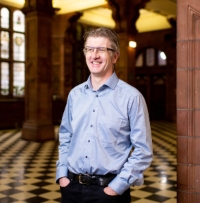Working together to change the world
Professor Hugh Coe, atmospheric scientist tells us about his research into air pollution and how the partnership between India and the University is mutually beneficial for this global challenge.

Manchester has an excellent reputation internationally and this recognition helps to foster key links with researchers and academics across the world.
Professor Hugh Coe / Atmospheric scientist, The University of Manchester
An international concern
Air pollution is not specific to a particular country. What does change from country to country is the relative importance of different emissions since energy use and activities vary widely. For example, rural India uses wood for cooking but this is no longer the case in urban India, however trash burning, including the burning of plastics, is an important contributor to air pollution.
The big challenge is in understanding the sources, the chemical drivers and the health impacts in order to build a framework for developing effective mitigation policy. It’s essential as air pollution is an important public health hazard.
My work at Manchester
My focus is the measurement of tiny atmospheric particles and their physical and chemical characteristics to see where their sources are in cities across the world, how they change in the atmosphere and how they’re transported.
In each breath we take there are upwards of 100 million particles but together these weigh less than a few nanograms. As the particles are so small (tens of times smaller than the width of a human hair), they can get deep into our lungs and enter our blood. Understanding which sources contribute most to the particle population and which are most toxic is a major research challenge that we need to resolve to better target public health and to develop better mitigation and reduction strategies.
The expertise that has built up within the research community in the UK helps Indian science teams develop their own capacity through training.
Professor Hugh Coe / Atmospheric scientist, The University of Manchester
Making an impact
Ten years ago we, as part of a large international team, showed that organic matter comprises a surprisingly large proportion of small pollution particles. Since then we have been developing our understanding of organic particulate pollution in our cities, what the causes are and how it can be reduced. Our most recent findings show that emissions of wood burning are a substantial source for air pollution, alongside vehicle gases, plants and solvents.
The expertise that has built up within the research community in the UK helps Indian science teams rapidly and effectively grow their research base, and the research in India helps the University learn about air pollution, its drivers, policies and public responses as they vary widely from region to region.
Why I came to Manchester
The University is a very large, internationally leading research centre and one that embeds its research in teaching and wider public engagement. The infrastructure is fantastic and state-of-the-art equipment and facilities are readily available. Access to important research tools and the expertise to utilise them ensures we’re at the forefront of technological advancement.
Manchester has an excellent reputation internationally and this recognition helps to foster key links with researchers and academics across the world. The support of business engagement teams and the international office, as well as expertise with our research and teaching support, enables you to reach out to international colleagues and grow partnerships across the world.
